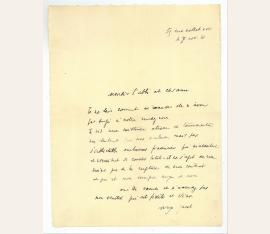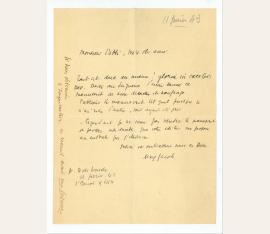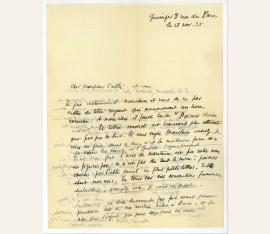poet, writer and novelist (1876-1944). Autograph manuscript in French by Jacob, A meditation on his love for Catholicism, entitled “Palm Sunday.” I “Dimanche des rameaux”. N. p. o. d. 1 page, 4to. With an original photograph of Max Jacob by Marcel Béalu.
3.500 €
(25647)
In part (translated): “You will live in sorrow as you live in sin because sin cannot get enough of himself and what cannot get enough of will suffer. Sin cannot control himself and what cannot control himself is troubled. Where there is trouble cannot be quiet and where there is no quiet there is no happiness. Jesus alone will make you get out of sin. So bless his coming in all the ways possible. Bless the coming of Jesus he only comes with love, with all the love of your soul…then the deliverance from sin will come.
The city expresses the joy on behalf of all cities and all nations: he just resurrecting the area known. He will resurrect the world after having resurrected himself...Resurrect us by him and with him. Find innocence because innocence is power and strength…the good, is happiness. Yes, Jesus entering in Jerusalem, it is happiness entering our lives for time and eternity. For the time, because the exemption of sin is happiness, for eternity because the one who will receive Jesus on the simple soul of love will live eternal life with Him. That all our minds cry out loud with the disciples: 'Hosanna!' And our bones cry like stones…The world will respond like the Pharisees, but he cannot silence our joy.” In very good condition, with moderate uniform toning, scattered creases, and various small edge tears. Accompanied by a vintage unsigned glossy press photo..
französischer Dichter, Maler und Schriftsteller (1876-1944). Eigenhändiger Brief mit Unterschrift. 4to. 2 pp. Gefaltet.
2.500 €
(83980)
„Cher ami, Moniseiur l’abbé.“: „[…] Comme je veux partir lundi soir par la Bretagne […], je me permettrai de vous confier le portrait de Picasso, car vous etes la seule personne en qui j’ai confance. […]
French poet, painter, writer, and critic (1876-1944). Autograph letter signed. No place. 19.02.1927. 4to. 2 pp.
1.650 €
(82862/BN54230)
To a gifted young writer about his vivid imagination: "J'ai été evenement interessé par vos poémes. Je dit proprement 'interessé'. Vous avez une imagination minutieuse, qui descend fort avant dans la reconstitution [...]". - Traces of folds.
French poet, painter, writer, and critic (1876-1944). Portrait photograph signed. No place. 07.09.1936. 293 x 235 mm.
1.500 €
(82863/BN54231)
Three-quarter profile, inscribed to the French priest and painter Maurice Morel (1908-91): "A Monsieur l'abbé Maurice Morel / son ami fidèle et reconnaissant / Max Jacob / 7. Sept. 36". - Morel found a mentor in Max Jacob, a Jewish convert to Catholicis who was a close friend of Pablo Picasso and other artistic-literary notables of the period. - With stamp of the photo studio "Photo Photomaton" on verso page.
French poet, painter, writer, and critic (1876-1944). Autograph letter signed. 59 rue Nollet [Paris]. 4to. 1 p.
1.500 €
(86125/BN57036)
Apologizing to his friend and protégé Maurice Morel, known as l'Abbé Morel, for having forgotten an appointment. In a desperate and almost certainly exaggerated apology, Jacob laments his "appalling and tormented existence", his poor health and his "inescapable financial embarrassments" that "absorb" him: "Je ne sais comment m'excuser de n'avoir pas songé à notre rendez-vous. Je vis une existence atroce et tourmenté non seulement par mes malades [!] mais parl'inéluctables embarras financiers qui m'absorbent et nécessitent des courses fatals; il ne s'agit de rien moins que de la rupture de mon contrat et qui est mon unique moyen de vivre".
- The "breach of his contract" and only means of livelihood that Jacob mentions in the end of the letter probably refers to his long litigation with an insurance company following a car accident in 1929. In 1932, Jacob finally was adjudged a small life annuity. - The devout catholic Jacob met the future priest Maurice Morel (1908-91) when he was taken in by father Albert Fleureau in Saint-Benoît-sur-Loire for detoxification in 1921. Jacob dedicated is 1921 poem "Le Laboratoire central" to Morel and encouraged him to follow his second calling as a painter. In his art, Morel was decidedly modern and abstract. He opened the catholic church of France to non-figurative art, even facilitating the introduction of modern art to the Vatican Museums. - Traces of folds..
French poet, painter, writer, and critic (1876-1944). Autograph letter signed. Saint-Benoît-sur-Loire. 8vo. 1 p.
2.500 €
(91555/BN60876)
To his friend and protégé Maurice Morel, known as l'Abbé Morel, concerning a manuscript that has been saved from his "shipwreck disaster" and hopes to publish it "as it is" after everything "has been taken" from Jacobs: "Tout est donc au même ! Gloria in excelsis Deo. Merci au Seigneur d'avoir sauvé ce manuscrit de mon désastre de naufrage. Publions le manuscrit tel que puisque je n'ai rien d'autre, tout ayant été pris. Cependant je ne veux pas vendre le manuscrit et perdre mes droits. Que votre éditeur me propose un contrat que j'étudierai".
- The touching letter is a testament to Max Jacob's desperate situation in occupied France and the importance of his Christian faith during this period. Whether Jacobs could have actually hoped for a publication under these circumstances is very doubtful. - Traces of folds..
French poet, painter, writer, and critic (1876-1944). Autograph letter signed. Quimper. 4to. 2 pp. With autograph envelope.
2.500 €
(91643/BN60964)
To his friend and protégé Maurice Morel, known as l'Abbé Morel, concerning a forthcoming publication of selected poems. Jacob asks Morel to insist with their friend, the theologian Jacques Maritain, to keep the insconspicuous title "Poémes choisis inédits" so as not to attract "hate and furor", as well as the information "chosen by l'abbé Morel". The second part of the letter concerns the contract, Jacob's dire financial situation, and the painter Jean Colle, who was currently in London and somehow involved in the projected publication.
While there is no publication of Max Jacob entitled "Poémes choisis inédits", it is very likely that the anthology in question is identical with the "Morceaux choisis" published by Gallimard in November 1936. - The devout Catholic Jacob met the future priest Maurice Morel (1908-91) when he was taken in by Father Albert Fleureau in Saint-Benoît-sur-Loire for detoxification in 1921. Jacob dedicated his 1921 poem "Le Laboratoire central" to Morel and encouraged him to follow his second calling as a painter. In his art, Morel was decidedly modern and abstract. He opened the Catholic Church of France to non-figurative art, even facilitating the introduction of modern art to the Vatican Museums. - Traces of folds..
verkauft
Autograph manuscript signed.
Autograph ist nicht mehr verfügbar
A fantastic poem, splendid manuscript on the spanish artist and sculptor Apel Fenosa. This manuscript from Jacob is reputed lost since many many years, like says the Fenosa fondation in the following article http://www.fundaciofenosa.org/descarregues/biografiaFRA.pdf Jacob wrote this text in 1928 for the first personal exhibition of Fenosa in Paris, in the Zborowski gallery. Very highly important document. "Fenosa a compris la grande leçon dionysiaque de la joie dans la chair. S’il en réprime les élans c’est par un amour nouveau de cette chair qu’il déifie par la pureté du modelé. O vases, O faces, O fastes ! On a dit « Fenosa archaïse ! » Est ce à cause de cette plénitude de formes simples et simplifiées. Non Fenosa, tu n’archaïses pas, mais ton âme polaire s’incendie à l’amour de la chair patriciennes. Tu stylises et tu aimes ! La sonate de tes groupes orchestre la sensualité et l’art. La sensualité orientale qui exagère les charmes de la femme et l’art qui les éternise, voilà le paradis de cette sculpture terrestre. Je dis bien terrestre. Les femmes de Fenosa ont la figure de Cybèle (…) J’ai contemplé la face auguste du n°43 et je me suis dit quelle Reine Stossa en ce marbre d’Athos. J’ai contemplé la guitariste aveugle aux cheveux de montagne dont le corps a la forme d’un instrument sonore et je me suis dit « l’harmonie n’a qu’un langage ». J’ai contemplé celui dont le corps est à peine plus gros que la cuisse et je me suis dit « si les cuisses sont pareilles à l’épée qu’elles avoisinent c’est pour signifier les victoires de l’amour ». J’ai contemplé les trois fillettes dont les enlacements sont les seuls atours et les croix, double croix de leurs bras si durs, de leurs bras si frêles et j’ai dit « cristallisation du Christ de l’amour, cristallisation de l’amour triple aux trois corbeilles de la sagesse siddhartienne ». J’ai contemplé celui qui s’arrache l’épine, j’ai contemplé celle qui s’accroche au miroir, j’ai contemplé la mère et j’ai dit « ce sont là les paroles du marbre ». J’ai contemplé les corps pareils à des poissons et j’ai dit « Carpe haut ! Carpeaux ! », j’ai dit « Auto art et non pas O toc art ! ». L’homme a le désir des corps étroits facile à embraser d’un bras d’un bracelet, l’homme a le désir des chairs glissantes comme les montagnes russes. Montées descentes. O beuté si tendre. Qu’en pense le Seigneur ? Mais ceci est une autre".







